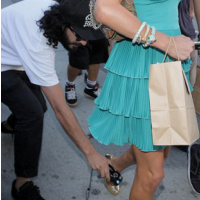Texas Appeals Court Dismisses Law Banning Upskirt and Downblouse Photographing in Public Places
 (photo: Don Chavez)
(photo: Don Chavez)
Unsavory as it might be, taking photographs of people in public for the purposes of sexual gratification is not illegal, a Texas appellate court has ruled in tossing a state law.
Lawmakers had outlawed “improper photography” in which “the photograph or recording
is made with the intent to arouse or gratify the sexual desire of any person.” But the Texas Court of Criminal Appeals ruled 8-1 that concerns about “upskirting” or “downblousing” cannot trump the rights of free speech under the First Amendment. Such photography, the justices wrote, is “inherently expressive” and therefore protected just like paintings, movies and books, according to the Houston Chronicle.
“The camera is essentially the photographer’s pen and paintbrush,” Presiding Judge Sharon Keller wrote for the majority. “A person’s purposeful creation of photographs and visual recordings is entitled to the same First Amendment protection as the photographs and visual recordings themselves.”
The challenge to the law came from Ronald Thompson, who was charged with 26 counts of improper photography when he took underwater pictures of children swimming at a San Antonio water park.
Thompson insisted the law was overly broad and could be used to punish artists and journalists, among others. The appellate justices agreed, as did law professor Peter Linzer at the University of Houston Law Center.
“It’s hard to see how you could make taking a picture a crime,” Linzer told the Chronicle. “To think that it’s unlawful to look at a little girl in a swimsuit, when you have lascivious thoughts, in public? And you did not do anything to that child? That cannot be made a crime in the United States,” he added. “The fact that some people might find that very offensive doesn’t change anything....You can’t prevent someone in public from looking at you and having dark thoughts.”
Another part of the law, which prohibited taking images in a bathroom or dressing room, was left intact. The court suggested that if the legislature chose to rewrite the law, it could focus on the privacy of the individual being photographed rather than perceived sexual thoughts of the photographer.
-Noel Brinkerhoff
To Learn More:
Texas Court Throws out ‘Upskirt’ Photo Law (by Cindy George, Houston Chronicle)
Texas Upskirt Photo Ban Ruled Unconstitutional (by Daniel Taylor, FindLaw)
Ruling (Texas Court of Criminal Appeals)
Massachusetts Supreme Court Okays Upskirt Photographing (by Noel Brinkerhoff, AllGov)
- Top Stories
- Unusual News
- Where is the Money Going?
- Controversies
- U.S. and the World
- Appointments and Resignations
- Latest News
- Trump Renames National Football League National Trump League
- Trump to Stop Deportations If…
- Trump Denounces World Series
- What If China Invaded the United States?
- Donald Trump Has a Mental Health Problem and It Has a Name






Comments